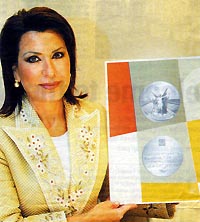|
New Medals Outshine 2004 Concerns
 Gianna Angelopoulos-Daskalaki
Gianna Angelopoulos-Daskalaki
|
By John Hadoulis, Athens News
PREPARATIONS for the Athens 2004 Games don't always make organizational sense, but in the Greeks know they're on safe ground when it comes to selling symbolism to the International Olympic Committee (IOC).
The Greeks persuaded the IOC to change the look of Olympic medals for the first time in 76 years, scrapping the present design of a Roman arena and replacing it with Athens' Kallimarmaro Stadium, the site of the first modern Games.
"We wanted to give the medals a Greek look from the start," Athens 2004 Organising Committee (ATHOC) president Gianna Angelopoulos-Daskalaki said at the medals' unveiling in July, during the IOC's 115th Session in Prague, which approved the changes. "As the IOC said, a historic injustice has been remedied," added ATHOC spokesman Serafeim Kotrotsos.
The victory symbol of a seated Nike on the front of the old medals was also abolished. In its place, Greek designers placed the standing Nike of Paionios, the statue dedicated to the temple of Zeus in Olympia in 425BC by the Mwssinians and Nafpaktians after the Peloponnesian War battle of Sfakteria.
Though the IOC agreed to keep the new design for future Games, Greek organizers could not say how long the Athens sponsored medals can expect to remain in use. "If we carry on like this, the Chinese will want to put their own symbols on (for the 2008 Games)," said Greek IOC member Lambis Nikolaou, indicating that the consensus was against further design changes.
"An easy session"
ATHOC was in Prague to deliver a progress report to the session and fully expected an easy ride despite a number of persistent construction concerns plaguing Athens' preparation.
Their confidence did not flag even when New Zealand IOC member Tay Wilson unexpectedly raised a stink about security. "I've heard there is a certain reluctance on the part of the security controllers in Greece to accept help from those more experienced in security matters," Wilson told the session.
Angelopoulos-Daskalaki responded that Athens "has the right budget and the right personnel in place" for the Games' security needs. Her spokesman insisted that Wilson's statement did not reflect the general IOC mood. "The room was laughing as he spoke," Kotrotsos said. "It was an easy session [for ATHOC]."
On the issue of general Games preparation, Angelopoulos-Daskalaki said Greek organizers "are approaching the final lap at a fast pace, and with confidence".
The IOC top brass obliged with a positive report. IOC president Jacques Rogge said he expects "perfect Games" in 2004, and Athens head overseer Denis Oswald added that the event should be "excellent" provided ATHOC and the Greek government tweak a number of problem areas. These include the Athens tram (whose construction in the missing 1km section in Paleo Faliro began just days ago over the protests of the local municipality), the severely delayed Karaiskaki football stadium and Santiago Calatrava's ambitious remodeling of the Olympic Stadium complex.
Terming the Calatrava project a "major concern", Oswald observed that the delivery of a steel-and-glass roof for the main stadium and velodrome is up to two months behind schedule, and once again advised organizers to forget the whole thing if they are not certain that it can be installed well before August 2004.
|


